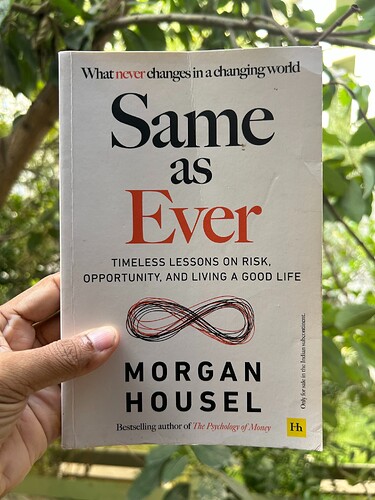Same as Ever, Morgan Housel, 2023 – I really enjoyed “The psychology of money” from the author and have read and enjoyed a few blog posts from the Collaborative fund blog, so buying this book was a nobrainer. “Hanging by a thread”, the first chapter with the ski accident is perhaps my favourite and I had read it earlier in this post. The book adds more to it by switching contexts to emphasize same point on risk, luck and randomness.
My notes –
-
Instead of worrying about what’s going to change in 10 years, its better to think about what’s not going to change in 10 years.
-
For Amazon, Bezos would say its impossible to imagine a future where Customers dont want low prices and fast shipping – so its a nobrainer to start investing aggressively on this
-
While its impossible to imagine a world 50 yrs from now, predicting that people will respond to greed, fear, opportunity, exploitation, risk, uncertainty, tribal affiliations and social persuasion is something you can certainly bet on
-
Invest in preparedness, not prediction – Taleb
-
In a world that tends to get better most of the time, its an important lifeskill to not to move the goalpost often
-
People don’t want to just be happy, they want to be happier than their neighbour and there in lies the problem
-
Money buys happiness in the same way drugs buy pleasure – incredible if done right but dangerous if used to mask a weakness and disastrous if no amount is sufficient
-
Today’s economy is good at generating wealth, ability to show-off wealth and generate envy for other people’s wealth
-
You think you want progress for yourself and the world but thats not what you want. What you want is a great gap between expectations and reality (importance of keeping expectations grounded)
-
Doctrine becomes dogma if you don’t challenge assumptions
-
People don’t want accuracy, they want certainty
-
Probability is about nuance and gradation but people pay attention only to black-and-white results and right/wrong outcomes since it requires the least effort
-
Not the best idea, not even the right idea or the most rational idea but the one that catches people’sattention – the best story wins. If you have the right answer and you’re a good storyteller, you will get ahead. Even within a good story, a powerful phrase or sentence can do most of the work (Harari or Bill Bryson’s work as an eg.)
-
The valuation of every company in the stock market is simply a number from today multiplied by a story about tomorrow
-
Humor is a way to show you’re smart, without bragging (Twain)
-
When a topic is complex, stories are like leverage
-
Who has the right answer but I ignore, because they’re inarticulate? What do I believe is true but is actually just good marketing?
-
Logic is an invention of man and may be ignored by the universe (Durant)
-
When anecdotes and data disagree, the anecdotes are usually right (Bezos)
-
Economic value – whatever someone wants has value, regardless of reason (if any)
-
Stability is destabilising (Minsky). Lack of recessions plant seeds for the next recession.
-
Enantiodromia – excess of something gives rise to the opposite (Jung)
-
At your highest moment, be careful. Thats when the devil comes for you (Washington)
-
There’s an optimum size for all businesses. Push past it and revenue might scale but disappointed customers scale faster (Schultz on Starbucks)
-
Radar, atomic energy, internet, microprocessors, jets, rockets, antibiotics, highways, helicopters, GPS, digital photography, microwave oven, synthetic rubber – all came from military as a consequence of wars
-
Save like a pessimist and invest like an optimist
-
Body size is like leverage in investing. Evolution encourages you to be bigger but then punishes you for being big (T-Rex).
-
In investing, law and medicine – when “do nothing” is the best answer, “do something” is the career incentive
-
What you need to identify are the 3-12 core principles that govern any field (John Reed in book “Succeeding”). The million other things are just various combination of the core principles. Paying attention to a few variables while ignoring a lot of others can make you seem ignorant but that’s what you need to do
-
Disagreement has less to do with what people know and more to do with what they have experienced
The book is mostly a rehash of what’s already in his earlier book but its not necessarily a bad thing. Most of my fav parts (~50%) are actually quotes by others but Housel has a way of bringing in the best to substantiate a point. It is enjoyable to read but the book is more like an extended blog post, than a book. 8/10
| Subscribe To Our Free Newsletter |


